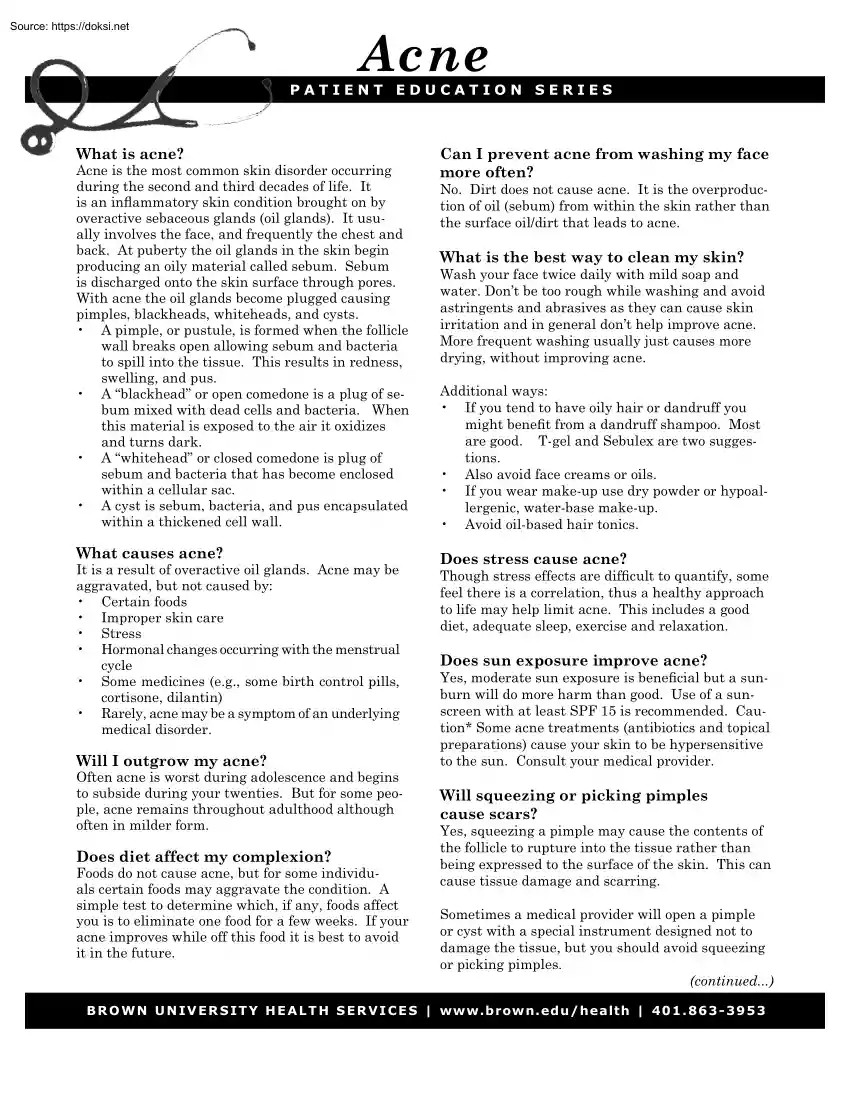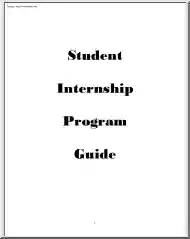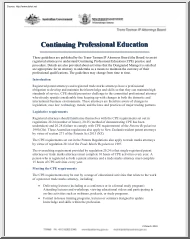Please log in to read this in our online viewer!

Please log in to read this in our online viewer!
No comments yet. You can be the first!
What did others read after this?
Content extract
Acne PATIENT EDUCATION SERIES What is acne? Acne is the most common skin disorder occurring during the second and third decades of life. It is an inflammatory skin condition brought on by overactive sebaceous glands (oil glands). It usually involves the face, and frequently the chest and back. At puberty the oil glands in the skin begin producing an oily material called sebum. Sebum is discharged onto the skin surface through pores. With acne the oil glands become plugged causing pimples, blackheads, whiteheads, and cysts. • A pimple, or pustule, is formed when the follicle wall breaks open allowing sebum and bacteria to spill into the tissue. This results in redness, swelling, and pus. • A “blackhead” or open comedone is a plug of sebum mixed with dead cells and bacteria. When this material is exposed to the air it oxidizes and turns dark. • A “whitehead” or closed comedone is plug of sebum and bacteria that has become enclosed within a cellular sac. • A cyst
is sebum, bacteria, and pus encapsulated within a thickened cell wall. What causes acne? It is a result of overactive oil glands. Acne may be aggravated, but not caused by: • Certain foods • Improper skin care • Stress • Hormonal changes occurring with the menstrual cycle • Some medicines (e.g, some birth control pills, cortisone, dilantin) • Rarely, acne may be a symptom of an underlying medical disorder. Will I outgrow my acne? Often acne is worst during adolescence and begins to subside during your twenties. But for some people, acne remains throughout adulthood although often in milder form. Does diet affect my complexion? Foods do not cause acne, but for some individuals certain foods may aggravate the condition. A simple test to determine which, if any, foods affect you is to eliminate one food for a few weeks. If your acne improves while off this food it is best to avoid it in the future. Can I prevent acne from washing my face more often? No. Dirt does not
cause acne It is the overproduction of oil (sebum) from within the skin rather than the surface oil/dirt that leads to acne. What is the best way to clean my skin? Wash your face twice daily with mild soap and water. Don’t be too rough while washing and avoid astringents and abrasives as they can cause skin irritation and in general don’t help improve acne. More frequent washing usually just causes more drying, without improving acne. Additional ways: • If you tend to have oily hair or dandruff you might benefit from a dandruff shampoo. Most are good. T-gel and Sebulex are two suggestions • Also avoid face creams or oils. • If you wear make-up use dry powder or hypoallergenic, water-base make-up. • Avoid oil-based hair tonics. Does stress cause acne? Though stress effects are difficult to quantify, some feel there is a correlation, thus a healthy approach to life may help limit acne. This includes a good diet, adequate sleep, exercise and relaxation. Does sun exposure
improve acne? Yes, moderate sun exposure is beneficial but a sunburn will do more harm than good. Use of a sunscreen with at least SPF 15 is recommended Caution* Some acne treatments (antibiotics and topical preparations) cause your skin to be hypersensitive to the sun. Consult your medical provider Will squeezing or picking pimples cause scars? Yes, squeezing a pimple may cause the contents of the follicle to rupture into the tissue rather than being expressed to the surface of the skin. This can cause tissue damage and scarring. Sometimes a medical provider will open a pimple or cyst with a special instrument designed not to damage the tissue, but you should avoid squeezing or picking pimples. (continued.) B R O W N U N I V E R S I T Y H E A L T H S E R V I C E S | www.brownedu/health | 4 0 1 8 6 3 - 3 9 5 3 What is the best treatment for acne? There are many different ways to treat acne. What’s best for you may not work for your friend and vice versa. Treatment
should be based on the individual condition. Although there is no cure for acne there are treatments which can control it well. If you have been unsuccessful in your attempt to control your acne, it is time to seek professional advice. Depending on the severity and type of acne you may be prescribed a medicine to be applied topically, taken orally, or both. • Topical retinoids (e.g RETIN-A, Differin) are effective for treating comedones (blackheads) but have limited benefit for inflammatory lesions such as pustules or cysts. • Topical antimicrobials (e.g Benzoyl peroxide) help to reduce skin bacteria. These can provide good results for an individual with mild inflammatory acne (pustules/pimples) but can be irritating to the skin. • Antibiotic therapy is generally reserved for individuals with moderate to severe acne. Topical antibiotics (e.g Cleocin-T, Benzamycin) are often helpful for mild cases of acne Oral antibiotics (tetracyclines, erythromycin) have been used for years with
good results and few side effects. Hormonal treatment? Women using birth control pills often find that it helps their acne. Your medical provider will make suggestions regarding specific pill choices. Less common hormonal imbalances can be a worsening factor for some women also. Some dermatologists use anti-androgenic medicine to treat acne such as spironolactone. What is Isotretinoin? (The original brand, Accutane, is no longer made but there are several equivalent brands available.) It is only used when conventional treatments, (topicals and oral antibiotics) have been ineffective. It causes extreme lip-drying, frequent nosebleeds, and many other possible side effects. Pregnancy must be avoided, as it causes severe birth defects. Accutane treatment is very expensive and also requires monthly blood tests and visits with the dermatologist during the usual 20-week course of use. 4/13 What are the side effects of antibiotics? • • • • • Topical treatments may
cause skin irritation, but generally are well tolerated. Topical clindamycin (Cleocin-T) has caused rare cases of diarrhea and colitis. Tetracyclines and erythromycin are the most common ones used Gastrointestinal upset may occur with any antibiotic. Photosensitivity is a side effect with tetracyclines. Limit your sun exposure and wear sunscreen and protective clothing Some individuals with mild to moderate acne find they can decrease or go without antibiotic treatment in the summer. Consult your medical provider Some women experience yeast vaginitis while on antibiotics. If vaginal itching or discharge develops consult your provider. There are other less common side effects. If you have any question or concerns don’t hesitate to ask your medical provider. B R O W N U N I V E R S I T Y H E A L T H S E R V I C E S | www.brownedu/health | 4 0 1 8 6 3 - 3 9 5 3
is sebum, bacteria, and pus encapsulated within a thickened cell wall. What causes acne? It is a result of overactive oil glands. Acne may be aggravated, but not caused by: • Certain foods • Improper skin care • Stress • Hormonal changes occurring with the menstrual cycle • Some medicines (e.g, some birth control pills, cortisone, dilantin) • Rarely, acne may be a symptom of an underlying medical disorder. Will I outgrow my acne? Often acne is worst during adolescence and begins to subside during your twenties. But for some people, acne remains throughout adulthood although often in milder form. Does diet affect my complexion? Foods do not cause acne, but for some individuals certain foods may aggravate the condition. A simple test to determine which, if any, foods affect you is to eliminate one food for a few weeks. If your acne improves while off this food it is best to avoid it in the future. Can I prevent acne from washing my face more often? No. Dirt does not
cause acne It is the overproduction of oil (sebum) from within the skin rather than the surface oil/dirt that leads to acne. What is the best way to clean my skin? Wash your face twice daily with mild soap and water. Don’t be too rough while washing and avoid astringents and abrasives as they can cause skin irritation and in general don’t help improve acne. More frequent washing usually just causes more drying, without improving acne. Additional ways: • If you tend to have oily hair or dandruff you might benefit from a dandruff shampoo. Most are good. T-gel and Sebulex are two suggestions • Also avoid face creams or oils. • If you wear make-up use dry powder or hypoallergenic, water-base make-up. • Avoid oil-based hair tonics. Does stress cause acne? Though stress effects are difficult to quantify, some feel there is a correlation, thus a healthy approach to life may help limit acne. This includes a good diet, adequate sleep, exercise and relaxation. Does sun exposure
improve acne? Yes, moderate sun exposure is beneficial but a sunburn will do more harm than good. Use of a sunscreen with at least SPF 15 is recommended Caution* Some acne treatments (antibiotics and topical preparations) cause your skin to be hypersensitive to the sun. Consult your medical provider Will squeezing or picking pimples cause scars? Yes, squeezing a pimple may cause the contents of the follicle to rupture into the tissue rather than being expressed to the surface of the skin. This can cause tissue damage and scarring. Sometimes a medical provider will open a pimple or cyst with a special instrument designed not to damage the tissue, but you should avoid squeezing or picking pimples. (continued.) B R O W N U N I V E R S I T Y H E A L T H S E R V I C E S | www.brownedu/health | 4 0 1 8 6 3 - 3 9 5 3 What is the best treatment for acne? There are many different ways to treat acne. What’s best for you may not work for your friend and vice versa. Treatment
should be based on the individual condition. Although there is no cure for acne there are treatments which can control it well. If you have been unsuccessful in your attempt to control your acne, it is time to seek professional advice. Depending on the severity and type of acne you may be prescribed a medicine to be applied topically, taken orally, or both. • Topical retinoids (e.g RETIN-A, Differin) are effective for treating comedones (blackheads) but have limited benefit for inflammatory lesions such as pustules or cysts. • Topical antimicrobials (e.g Benzoyl peroxide) help to reduce skin bacteria. These can provide good results for an individual with mild inflammatory acne (pustules/pimples) but can be irritating to the skin. • Antibiotic therapy is generally reserved for individuals with moderate to severe acne. Topical antibiotics (e.g Cleocin-T, Benzamycin) are often helpful for mild cases of acne Oral antibiotics (tetracyclines, erythromycin) have been used for years with
good results and few side effects. Hormonal treatment? Women using birth control pills often find that it helps their acne. Your medical provider will make suggestions regarding specific pill choices. Less common hormonal imbalances can be a worsening factor for some women also. Some dermatologists use anti-androgenic medicine to treat acne such as spironolactone. What is Isotretinoin? (The original brand, Accutane, is no longer made but there are several equivalent brands available.) It is only used when conventional treatments, (topicals and oral antibiotics) have been ineffective. It causes extreme lip-drying, frequent nosebleeds, and many other possible side effects. Pregnancy must be avoided, as it causes severe birth defects. Accutane treatment is very expensive and also requires monthly blood tests and visits with the dermatologist during the usual 20-week course of use. 4/13 What are the side effects of antibiotics? • • • • • Topical treatments may
cause skin irritation, but generally are well tolerated. Topical clindamycin (Cleocin-T) has caused rare cases of diarrhea and colitis. Tetracyclines and erythromycin are the most common ones used Gastrointestinal upset may occur with any antibiotic. Photosensitivity is a side effect with tetracyclines. Limit your sun exposure and wear sunscreen and protective clothing Some individuals with mild to moderate acne find they can decrease or go without antibiotic treatment in the summer. Consult your medical provider Some women experience yeast vaginitis while on antibiotics. If vaginal itching or discharge develops consult your provider. There are other less common side effects. If you have any question or concerns don’t hesitate to ask your medical provider. B R O W N U N I V E R S I T Y H E A L T H S E R V I C E S | www.brownedu/health | 4 0 1 8 6 3 - 3 9 5 3




